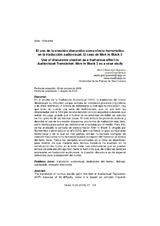El uso de la creación discursiva como efecto humorístico en la traducción audiovisual. El caso de Men in Black 3
El uso de la creación discursiva como efecto humorístico en la traducción audiovisual. El caso de Men in Black 3
Autor
González Quevedo, Marta
Cruz García, Laura
Editor
UCOPressFecha
2019Materia
Traducción audiovisualTraducción del humor
Doblaje
Subtitulado
Creación discursiva
Audiovisual Translation
Translation of Humor
Dubbing
Subtitling
Discursive Creation
METS:
Mostrar el registro METSPREMIS:
Mostrar el registro PREMISMetadatos
Mostrar el registro completo del ítemResumen
En el ámbito de la Traducción Audiovisual (TAV), la traducción del humor destaca por su dificultad, ya que se basa en complejos procesos lingüísticos y de difícil definición. A la hora de enfrentarse a este tipo de traducción, hay que tener en cuenta una serie de restricciones, que no son solo las relacionadas con la TAV per se sino también con los aspectos culturales que entran en juego, puesto que el humor no es universal: en todas las culturas se ríen, pero no de las mismas cosas. En este artículo se pretende analizar y describir el uso de la creación discursiva, una forma de traducción más libre, como técnica para salvar las restricciones impuestas por el medio. Para ello, se ha analizado la película de ciencia ficción Men in Black 3, dirigida por Sonnenfeld y estrenada en el año 2012, que manifiesta un gran componente humorístico y de la que se han podido extraer numerosos ejemplos de creación discursiva como herramienta para la creación del humor en el idioma del texto meta. Todos los ejemplos encontrados en el filme se describirán para mostrar de qué manera esta técnica traslativa ha ayudado en la construcción del humor en el texto meta. Las conclusiones que se pueden extraer de este estudio apuntan hacia el hecho de que, de todas las técnicas empleadas en traducción audiovisual, la creación discursiva es de especial relevancia para la traducción del humor. The translation of humour stands out in the field of Audiovisual Translation (AVT) because of its difficulty, since it is based on complex linguistic processes that are hard to define. When translating humour, it is necessary to consider a series of restrictions that are related not only to AVT, but also to the cultural aspects that come into play, since humour is not universal: people from all cultures laugh, but they do not laugh at the same jokes. In this article, the use of discursive creation is analysed and described. Discursive creation is a freer way of translation, and a technique used to overcome the restrictions imposed by the audiovisual text. In order to do that, the science-fiction movie Men in Black 3 (Sonnenfeld, 2012) has been analysed because of the great use of humour found throughout it. Due to that characteristic of the film, a great number of discursive creation techniques have been used as a tool to create humour in the language of the target text. All the examples found in the film will be described in order to explain the behavior of the discursive creation in each sample and show the way this translation technique has helped in the creation of humour in the target text. The conclusions of this study point to the fact that among the techniques that are commonly used in AVT discursive creation is of great relevance for the translation of humor.

